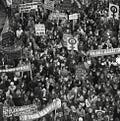What We Can Learn From The Icelandic Women Strike
Women took the day off from housework and childcare responsibilities in Iceland on October 24, 1975 and it changed the course of their country forever.
Hope your Labor Day weekend was splendid? As for me, I spent mine adding numerous items to cart for our 4th child due anytime soon!
Over the long weekend I shared my thoughts on the precarious situations we find ourselves as mothers in America today - where we feel mentally drained and powerless through the pandemic, not because of the virus itself but because of the way we have been treated by our partners, employers, and leaders. Its frustrating actually.
Being Labor Day, I decided to share the story of the Icelandic women on October 24, 1975. These women refused to cook, clean, or look after their children for one day. It brought the entire nation to a standstill as men scrambled to care for their children, taking them to work and overwhelming restaurants. This ultimately changed the course of Iceland forever.
According to BBC, when Ronald Reagan became the US President, one small boy in Iceland was outraged. "He can't be a president - he's a man!" he exclaimed to his mother when he saw the news on the television.
It was November 1980, five years after the historic Women's Day Off and Vigdis Finnbogadottir, a divorced single mother, had won Iceland's presidency that summer. The boy didn't know it, but Vigdis was Europe's first female president, and the first woman in the world to be democratically elected as a head of state.
Unpaid labor - time spent doing routine housework, shopping for necessary household goods, childcare, eldercare, and other household activities - remain largely invisible to economists. It isn’t part of a GDP calculation and doesn’t factor into measures of economic growth.
Traditional expectations that women will do this work for free obscure the true economic value of unpaid care. Yet, Icelandic women showed us a huge unacknowledged subsidy to the smooth functioning of our economies, which would grind to a halt if women stopped doing this work. In the last 18 months, due to covid-19 and its variants, women performed an average of 65+ hrs of unpaid work per week. 30+ of those hrs were spent on childcare, causing millions of women to forego paid work.
46 years after women took the day off in Iceland, the United States is still running on women’s unpaid work and has refused to respond to this increased workload since the pandemic.
So, what can be done? I think its time we call for a day off for mothers. Its time we truly demand a better quality of life for women and families that support women - especially and including women of color, caregivers, and more. It's time we demand better childcare policies, paid leave, paid sick time, and childcare worker protections.
Perhaps, you will join us? I'd love to hear from you.
All that said, now more than ever, I am excited about the work we are doing at Mother Honestly where we are creating sustainable solutions for women and families at home and in the workplace through community, media, and technology (Villo). If you want to be a part of any of this in any way, please email me directly at blessing@motherhonestly.com
More to come!
Blessing Adesiyan,
Founder & CEO,
Mother Honestly


